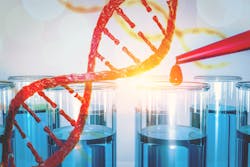UT Southwestern researchers have identified the molecular function of 87 inherited genetic variants that affect the risk of prostate cancer, and the majority appear to control the activity of genes located far away from the risk variants themselves. The findings, published in Cancer Discovery, could lead to better ways to assess cancer risk and new targets for anti-cancer drugs, the study authors say.
Researchers used several approaches to identify which genes serve as targets for the risk alleles. A three-dimensional mapping technique using data from 565 prostate cancer tumors showed that 87 of these risk alleles affected the activity of hundreds of genes.
Although malignant tumors typically arise in the prostate’s epithelial cells, researchers found that the affected genes were often in other tissue types, including stromal cells and smooth muscle cells that support the epithelial cells. Most of the risk alleles appeared to alter the activity of these genes, which produced proteins known to be involved in molecular pathways for development, apoptosis (programmed cell death), and metabolism, among other cellular processes.
Study leader Ram Mani, Ph.D., said some alleles had opposing activity on the multiple genes they control. For example, one allele known as rs8102476 simultaneously increased the activity of one gene while decreasing the activity of a neighboring gene. The risk alleles also had significant interaction with genes that acquired nonheritable mutations associated with prostate cancer; these interactions appeared to predict how aggressive a patient’s disease became.

